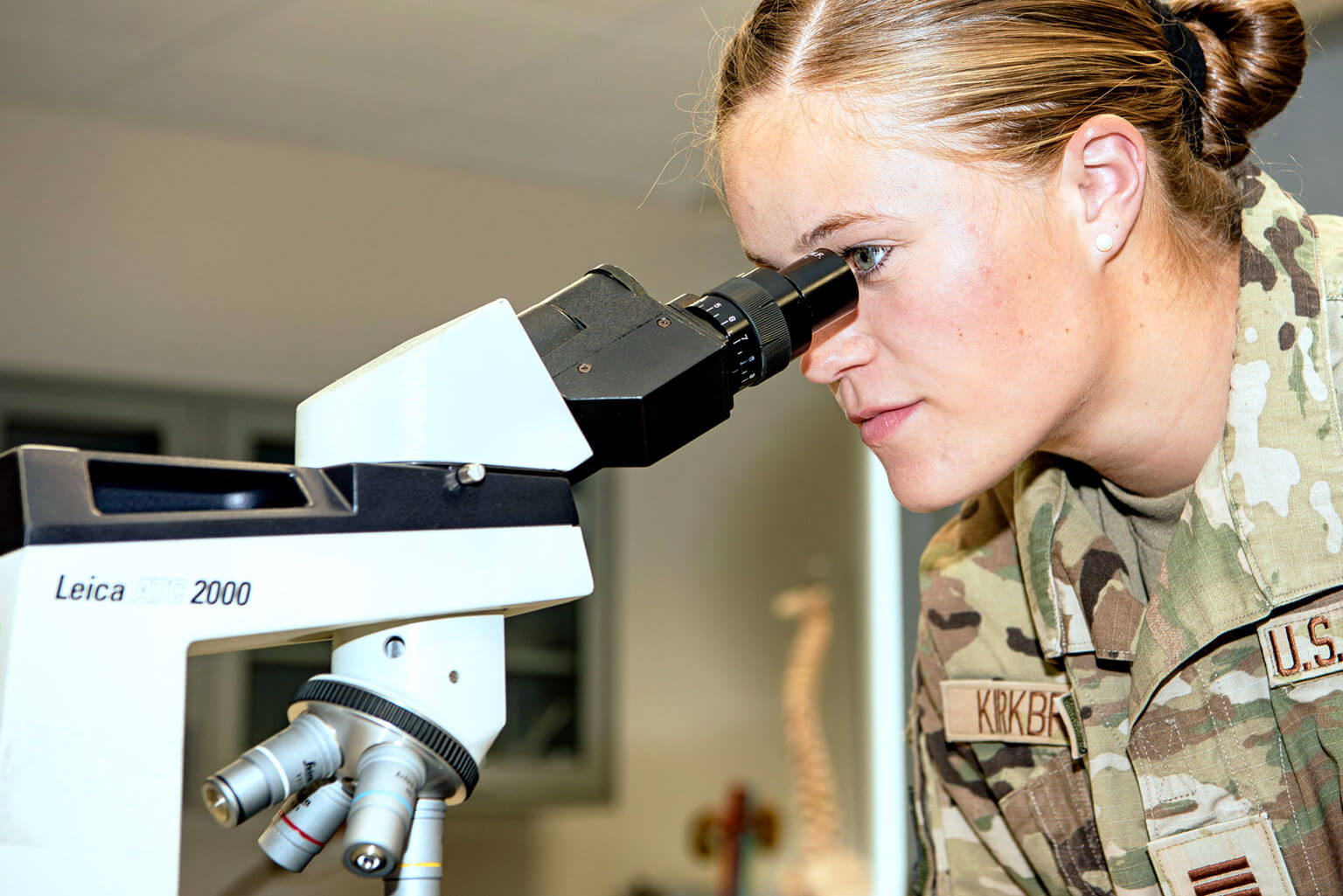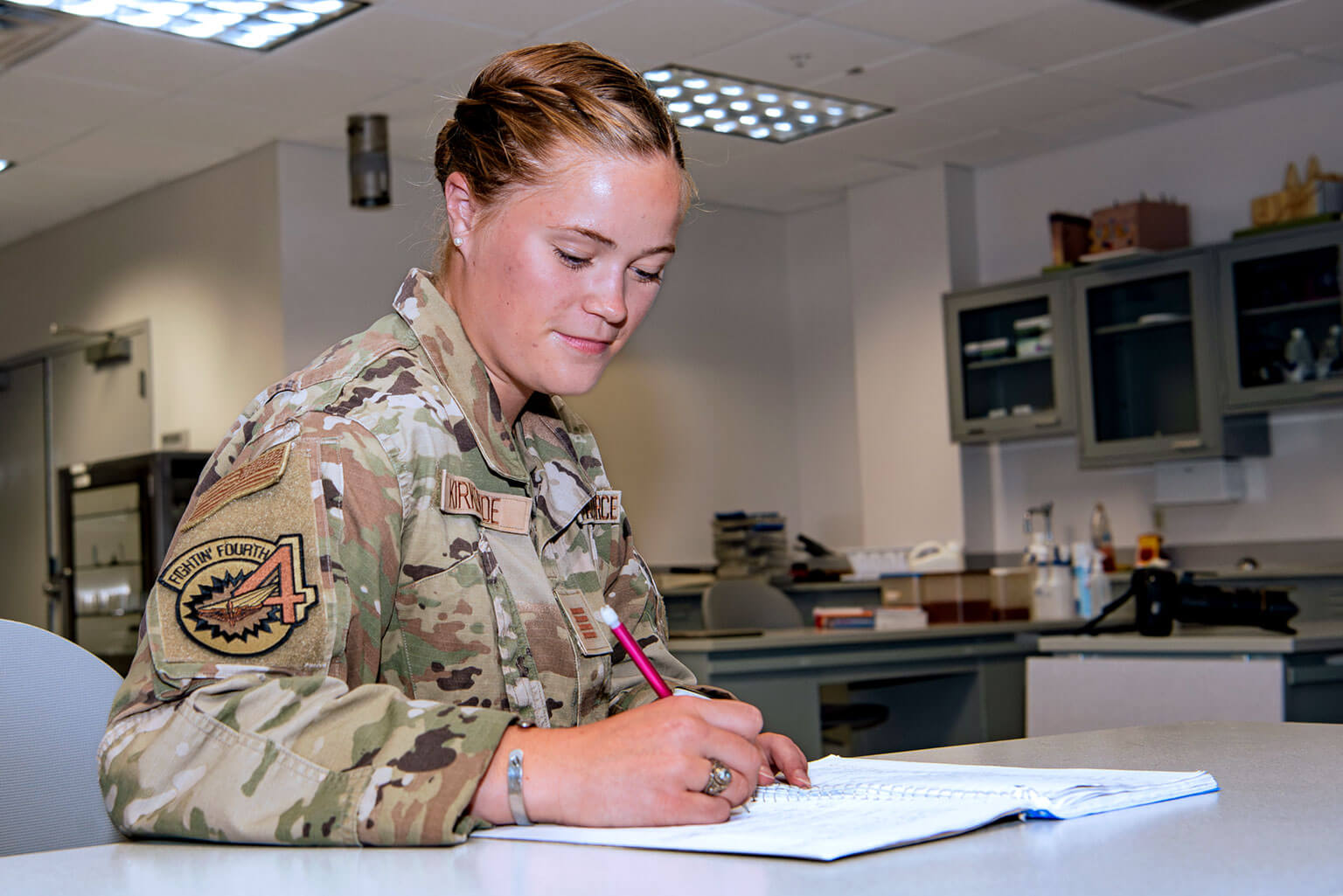Medical minor ensures cadets remain prepared for grad school

Cadet 1st Class Kayla Kirkbride conducts research in the U.S. Air Force Academy Department of Biology Aug. 5, 2024. In addition to her Biology major, she is also pursuing a minor in the newly available Pre-Health Professions. The minor makes cadets more competitive when pursuing a graduate program in the medical, dental, nursing, physician assistant and physical therapy tracks. (U.S. Air Force photo by Dylan Smith)
By Randy Roughton
U.S. Air Force Academy Strategic Communications
U.S. AIR FORCE ACADEMY, Colo. – The Pre-Health Professions minor makes cadets more competitive for medical or dental graduate programs.
The U.S. Air Force Academy minor requires 15-21 semester hours. It is designed to satisfy the prerequisite requirements for most health profession graduate programs and prepare cadets for their careers as U.S. Air Force and U.S. Space Force health professionals.
Providing a more tailored track
“The Pre-Health Professions minor simplified and tailored the prerequisites for those health profession schools for me,” said Cadet 1st Class Kayla Kirkbride. “It builds the foundations of Biology, Chemistry and Physics that those schools look for. I also think it provides an acknowledgement of the extra effort and time that goes into pursuing careers later down the line in the medical fields.”
Cadets pursuing the Biology, Chemistry/Biochemistry or the Behavioral Sciences and Leadership/Health Professions concentration have pre-health tracks within their majors that fulfill most minor requirements. Those tracks are the combined pre-dental and pre-medical, pre-nursing, pre-physical assistant and pre-physical therapy. In addition to 93 semester hours of academic core courses, pre-dental and pre-medical track cadets complete 21 Pre-Health Professions minor hours. Pre-nursing track cadets complete an additional 15 semester hours. Cadets on the pre-physician assistant and pre-physical therapy tracks complete an additional 18 and 16 hours, respectively.
Impact on cadet acceptance into medical school
The minor has already shown an increase in cadet medical school acceptance rate. Every cadet from the Class of 2023 who applied to medical school was accepted, a 30% increase from two years earlier, said Dr. Katherine Bates, health professions director and advisor. The average acceptance rate since 2018 is 86 percent. Bates began creating the minor shortly after she arrived at the Academy in 2015. The minor also helps academic advisors know exactly what courses their cadets need complete if they want to pursue a post-graduate health profession program.
“The prerequisites for most health profession programs are quite extensive,” Bates said. “Cadets must take a lot of classes to qualify for medical or physical therapy school, and they didn’t always fit within the major. Additionally, they weren’t receiving any acknowledgment that they were taking an extra 15 to 21 credit hours. At the very least, I wanted to acknowledge and celebrate all the work they were doing. Also, when the medical schools look at their applications, they will see that this wasn’t a last-minute decision. This minor was a conscious choice for our cadets.”

Cadet 1st Class Kayla Kirkbride conducts research in the U.S. Air Force Academy Department of Biology Aug. 5, 2024. In addition to her Biology major, she is also pursuing a minor in the newly available Pre-Health Professions. The minor makes cadets more competitive when pursuing a graduate program in the medical, dental, nursing, physician assistant and physical therapy tracks. (U.S. Air Force photo by Dylan Smith)
Benefitting officers later in their careers
While the Pre-Health Professions minor benefits cadets pursuing health-related degrees and contemplating post-graduate work in the health-care field, it can also help graduates who may want to apply later in their Air Force or Space Force careers, Kirkbride said.
“This minor isn’t just for people pursuing careers in the health professions field right out of the Academy,” she said. “It’s open to anyone interested in pursuing it later, maybe after working in the pilot Air Force Specialty Code and then cross-training into health professions.”
Learn more about Biology, Chemistry and Behavioral Sciences and Leadership majors.